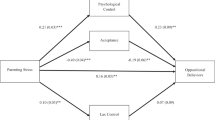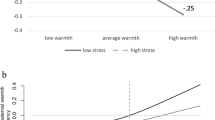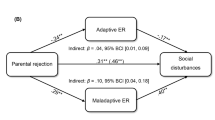Abstract
Research documents that lability in parent-child relationships–fluctuations up and down in parent-child relationships–is normative during adolescence and is associated with increased risk for negative outcomes for youth. Yet little is known about factors that predict lability in parenting. This study evaluated whether children’s behaviors predicted lability in parent-child relationships. Specifically this study tested whether youth maladjustment (delinquency, substance use, internalizing problems) in Grade 6 was associated with greater lability (e.g., more fluctuations) in parents’ warmth and hostility towards their children across Grades 6–8. The study also tested whether the associations between youth maladjustment and lability in parents’ warmth and hostility were moderated by parents’ internalizing problems. The sample included youth and their parents in two parent families who resided in rural communities and small towns (N = 618; 52% girls, 90% Caucasian). Findings suggest that parents’ internalizing problems moderated the associations between child maladjustment and parenting lability. Among parents with high levels of internalizing problems, higher levels of youth maladjustment were associated with greater lability in parents’ warmth. Among parents with low in internalizing problems, higher levels of youth maladjustment were associated with less lability in parents’ warmth. The discussion focuses on how and why parent internalizing problems may affect parental reactivity to youth problem behavior and intervention implications.




Similar content being viewed by others
References
Achenbach, T. M., & Rescorla, L. A. (2001). Manual for the ASEBA school-age forms and profiles. Burlington, VT: University of Vermont, Research Center for Children, Youth, and Families.
Allen, J. P., Manning, N., & Meyer, J. (2010). Tightly linked systems: Reciprocal relations between maternal depressive symptoms and maternal reports of adolescent externalizing behavior. Journal of Abnormal Psychology, 119(4), 825–835.
Angst, J., Gamma, A., Gastpar, M., Lépine, J. P., Mendlewicz, J., & Tylee, A. (2002). Gender differences in depression. European Archives of Psychiatry and Clinical Neuroscience, 252(5), 201–209. https://doi.org/10.1007/s00406-002-0381-6.
Belsky, J. (1984). The determinants of parenting: a process model. Child Development, 55, 83–96. https://doi.org/10.2307/1129836.
Bornstein, M. H. (2015). Children’s parents. In M. H. Bornstein & T. Leventhal (Eds.), Ecological settings and processes in developmental systems. In R. M. Lerner (Editor-in-chief), Handbook of child psychology and developmental science (7th ed., Vol. 4, pp. 55-31). Hoboken, NJ: Wiley.
Brinberg, M., Fosco, G. M., & Ram, N. (2017). Examining inter-family differences in intra-family (parent-adolescent) dynamics using Grid-Sequence Analysis. Journal of Family Psychology, 31(8), 994–1004.
Bronfenbrenner, U. (2005). Making human beings human: bioecological perspectives on human development. Thousand Oaks, California: Sage.
Carrasco, M. A., Holgado, F. P., Rodríguez, M. A., & Del Barrio, M. V. (2009). Concurrent and across-time relations between mother/father hostility and children’s aggression: a longitudinal study. Journal of Family Violence, 24(4), 213–220. https://doi.org/10.1007/s10896-009-9222-y.
Conger, R. D. (1989). Iowa Youth and Families Project, Wave A. Report prepared for Iowa State University. Ames, IA: Institute for Social and Behavioral Research.
Cox, M. J., & Paley, B. (2003). Understanding families as systems. Current Directions in Psychological Science, 12(5), 193–196. https://doi.org/10.1111/1467-8721.01259.
Cyranowski, J. M., Frank, E., Young, E., & Shear, M. K. (2000). Adolescent onset of the gender difference in lifetime rates of major depression: A theoretical model. Archives of General Psychiatry, 57(1), 21–27. https://doi.org/10.1001/archpsyc.57.1.21.
Dallaire, D. H., Pineda, A. Q., Cole, D. A., Ciesla, J. A., Jacquez, F., LaGrange, B., & Bruce, A. E. (2006). Relation of positive and negative parenting to children’s depressive symptoms. Journal of Clinical Child and Adolescent Psychology, 35(2), 313–322. https://doi.org/10.1207/s15374424jccp3502_15.
De Los Reyes, A., & Kazdin, A. E. (2005). Informant discrepancies in the assessment of childhood psychopathology: A critical review, theoretical framework, and recommendations for further study. Psychological Bulletin, 131(4), 483–509. https://doi.org/10.1037/0033-2909.131.4.483.
Derogatis, L., & Unger, R. (2010). Symptom Checklist-90-Revised. In I. Weiner & W. E. Craighead (Eds.), The Corsini Encyclopedia of Psychology (pp. 81–84). Hoboken, NJ: Wiley.
Elliott, D. S., Ageton, S. S., & Huizinga, D. (1982). Explaining delinquency and drug use. Beverly Hills, CA: Sage.
Elgar, F. J., Mills, R. S., McGrath, P. J., Waschbusch, D. A., & Brownridge, D. A. (2007). Maternal and paternal depressive symptoms and child maladjustment: The mediating role of parental behavior. Journal of Abnormal Child Psychology, 35(6), 943–955.
Fosco, G. M., Lippold, M., & Feinberg, M. E. (2014). Interparental boundary problems, parent–adolescent hostility, and adolescent–parent hostility: A family process model for adolescent aggression problems. Couple and Family Psychology: Research and Practice, 3(3), 141–155. https://doi.org/10.1037/cfp0000025.
Glatz, T., Stattin, H., & Kerr, M. (2011). Parents’ reactions to youths’ hyperactivity, impulsivity, and attention problems. Journal of Abnormal Child Psychology, 39(8), 1125–1135. https://doi.org/10.1007/s10802-011-9541-3.
Goodman, S. H. (2007). Depression in mothers. Annual Review of Clinical Psychology, 3, 107–135. https://doi.org/10.1146/annurev.clinpsy.3.022806.091401.
Gotlib, I. H., Gilboa, E., & Sommerfeld, B. K. (2000). Cognitive functioning indepression. In R. Davidson (Ed.), Anxiety, depression, and emotion (pp. 133–163). New York, NY: Oxford University Press.
Greenberg, M. T., & Lippold, M. A. (2013). Promoting healthy outcomes among youth with multiple risks: Innovative approaches. Annual Review of Public Health, 34, 253–270. https://doi.org/10.1146/annurev-publhealth-031811-124619.
Hafen, C. A., & Laursen, B. (2009). More problems and less support: early adolescent adjustment forecasts changes in perceived support from parents. Journal of Family Psychology, 23(2), 193–202. https://doi.org/10.1037/a0015077.
Hammen, C. (2006). Stress generation in depression: reflections on origins, research, and future directions. Journal of Clinical Psychology, 62(9), 1065–1082. https://doi.org/10.1002/jclp.20293.
Hipwell, A., Keenan, K., Kasza, K., Loeber, R., Stouthamer-Loeber, M., & Bean, T. (2008). Reciprocal influences between girls’ conduct problems and depression, and parental punishment and warmth: a six year prospective analysis. Journal of Abnormal Child Psychology, 36(5), 663–677. https://doi.org/10.1007/s10802-007-9206-4.
Ho, C., Bluestein, D. N., & Jenkins, J. M. (2008). Cultural differences in the relationship between parenting and children’s behavior. Developmental Psychology, 44(2), 507–522.
Huh, D., Tristan, J., Wade, E., & Stice, E. (2006). Does problem behavior elicit poor parenting? A prospective study of adolescent girls. Journal of Adolescent Research, 21(2), 185–204. https://doi.org/10.1177/0743558405285462.
Kim, K. J., Conger, R. D., Lorenz, F. O., & Elder, Jr., G. H. (2001). Parent–adolescent reciprocity in negative affect and its relation to early adult social development. Developmental Psychology, 37(6), 775–790. https://doi.org/10.1037/0012-1649.37.6.775.
Kornstein, S. G., Schatzberg, A. F., Thase, M. E., Yonkers, K. A., McCullough, J. P., Keitner, G. I., & Keller, M. B. (2000). Gender differences in chronic major and double depression. Journal of Affective Disorders, 60(1), 1–11. https://doi.org/10.1016/S0165-0327(99)00158-5.
Lam, C. B., McHale, S. M., & Crouter, A. C. (2012). Parent–child shared time from middle childhood to late adolescence: Developmental course and adjustment correlates. Child Development, 83(6), 2089–2103. https://doi.org/10.1111/j.1467-8624.2012.01826.x.
Lansford, J. E., Rothenberg, W. A., Jensen, T. M., Lippold, M. A., Bacchini, D., Bornstein, M. H., & Malone, P. S. (2018). Bidirectional relations between parenting and behavior problems from age 8 to 13 in nine countries. Journal of Research on Adolescence, 28(3), 571–590. https://doi.org/10.1111/jora.12381.
Leventhal, T., & Brooks-Gunn, J. (2000). The neighborhoods they live in: The effects of neighborhood residence on child and adolescent outcomes. Psychological Bulletin, 126(2), 309–337. https://doi.org/10.1037/0033-2909.126.2.309.
Lippold, M. A., Davis, K. D., Lawson, K. M., & McHale, S. M. (2016). Day-to-day Consistency in positive parent–child interactions and youth well-being. Journal of Child and Family Studies, 25, 3584–3592. https://doi.org/10.1007/s10826-016-0502-x.
Lippold, M. A., Fosco, G. M., Ram, N., & Feinberg, M. E. (2016). Knowledge lability: Within-person changes in parental knowledge and their associations with adolescent problem behavior. Prevention Science, 17(2), 274–283. https://doi.org/10.1007/s11121-015-0604-5.
Lippold, M. A., Hussong, A., Fosco, G. M., & Ram, N. (2018). Lability in the parent’s hostility and warmth toward their adolescent: Linkages to youth delinquency and substance use. Developmental Psychology, 54(2), 348–361. https://doi.org/10.1037/dev0000415.
Lippold, M. A., McHale, S. M., Davis, K. D., & Kossek, E. (2015). Day-to-day inconsistency in parental knowledge: Linkages to youth health and parental stress. The Journal of Adolescent Health, 56(3), 293–299.
Lovejoy, M. C., Graczyk, P. A., O’Hare, E., & Neuman, G. (2000). Maternal depression and parenting behavior: A meta-analytic review. Clinical Psychology Review, 20(5), 561–592. https://doi.org/10.1016/S0272-7358(98)00100-7.
Marceau, K., Ram, N., & Susman, E. J. (2015). Development and lability in the parent-child relationship during adolescence: Associations with pubertal timing and tempo. Journal of Research on Adolescence, 25(3), 474–489. https://doi.org/10.1111/jora.12139.
Marmorstein, N. R., & Iacono, W. G. (2004). Major depression and conduct disorder in youth: Associations with parental psychopathology and parent–child conflict. Journal of Child Psychology and Psychiatry, 45(2), 377–386. https://doi.org/10.1111/j.1469-7610.2004.00228.x.
McHale, S. M., Crouter, A. C., & Whiteman, S. D. (2003). The family contexts of gender development in childhood and adolescence. Social Development, 12(1), 125–148. https://doi.org/10.1111/1467-9507.00225.
McMahon, R. J., & Metzler, C. W. (1998). Selecting parenting measures for assessing family-based prevention interventions. In R. S. Ashery, E. B. Robertson & K. L. Kumpfer (Eds.), Drug abuse prevention through family interventions. NIDA Research Monograph (pp. 294–323). Rockville, MD: National Institute on Drug Abuse. 177.
Nolen-Hoeksema, S., Larson, J., & Grayson, C. (1999). Explaining the gender difference in depressive symptoms. Journal of Personality and Social Psychology, 77(5), 1061–1072. https://doi.org/10.1037/0022-3514.77.5.1061.
Ram, N., Gerstorf, D., Lindenberger, U., & Smith, J. (2011). Developmental change and intraindividual variability: Relating cognitive aging to cognitive plasticity, cardiovascular lability, and emotional diversity. Psychology and Aging, 26(2), 363–371. https://doi.org/10.1037/a0021500.
Ram, N., & Grimm, K. J. (2015). Growth curve modeling and longitudinal factor analysis. In W.Damon, & R. M. Lerner (Series Eds.), W. Overton, & P. C. M. Molenaar (Vol. Eds.), Handbook of child psychology and developmental science: Vol. 1. Theoretical models of human development (7th edn., pp. 758–788). Hoboken, NJ: Wiley.
Redmond, C., Schainker, L., Shin, C., & Spoth, R. (2007). Discrepancies between in-home and in-school adolescent self-reports of substance use. Poster presented at the Annual Meeting of the Society for Prevention Research, Washington, D.C.
Reitz, E., Deković, M., & Meijer, A. M. (2006). Relations between parenting and externalizing and internalizing problem behaviour in early adolescence: Child behaviour as moderator and predictor. Journal of Adolescence, 29(3), 419–436. https://doi.org/10.1016/j.adolescence.2005.08.003.
Sameroff, A. (Ed.) (2009). The transactional model of development: How children and contexts shape each other (pp. 3–21). Washington D.C.: American Psychological Association.
Sheeber, L. B., Johnston, C., Chen, M., Leve, C., Hops, H., & Davis, B. (2009). Mothers’ and fathers’ attributions for adolescent behavior: An examination in families of depressed, subdiagnostic, and non-depressed youth. Journal of Family Psychology, 23(6), 871–881. https://doi.org/10.1037/a0016758.
Spoth, R., Greenberg, M. T., Bierman, K., & Redmond, C. (2004). PROSPER community-university partnership model for public education systems: Capacity-building for evidence-based, competence-building prevention. Prevention Science, 5(1), 31–39. https://doi.org/10.1023/B:PREV.0000013979.52796.8b.
Steinberg, L., & Morris, A. S. (2001). Adolescent development. Journal of Cognitive Education and Psychology, 2(1), 55–87. https://doi.org/10.1891/194589501787383444.
Williams, L. R., & Steinberg, L. (2011). Reciprocal relations between parenting and adjustment in a sample of juvenile offenders. Child Development, 82(2), 633–645. https://doi.org/10.1111/j.1467-8624.2010.01523.x.
Acknowledgements
Work on this study was supported by research grants from the National Institutes of Health including R03 DA038685 and R01 DA013709. Further support was given to Gregory Fosco through the Karl R. and Diane Wendle Fink Early Career Professorship for the Study of Families. The content is solely the responsibility of the authors and does not necessarily represent the official views of the National Institute on Drug Abuse or the National Institutes of Health.
Authors’ Contributions
M.L. conceived of the study, ran the analyses, and drafted the manuscript. G.F. participated in the design of the study, aided in the interpretation of the data and findings, and provided feedback on drafts. A.H. participated in the design of the study, aided in the interpretation of the data and findings, and provided feedback on drafts. N.R. provided conceptual and statistical consultation, aided in the interpretation of the data and findings, and provided feedback on drafts. All authors read and approved the final manuscript.
Funding
Work on this paper was supported by research grants from the National Institutes of Health including R03 DA038685 and R01 DA013709. Further support was given to Gregory Fosco through the Karl R. and Diane Wendle Fink Early Career Professorship for the Study of Families.
Data Sharing and Declaration
This manuscript’s data will not be deposited.
Author information
Authors and Affiliations
Corresponding author
Ethics declarations
Conflict of Interest
The authors declare that they have no conflict of interest.
Ethical Approval
The original PROSPER study procedures were approved by Institutional Review Board at The Pennsylvania State University, where the study was housed. All procedures performed in studies involving human participants were in accordance with the ethical standards of the institutional and/or national research committee and with the 1964 Helsinki declaration and its later amendments or comparable ethical standards. The study here used deidentified secondary data from the PROSPER project. Therefore it was deemed exempt from the Institution Review Board at The University of North Carolina at Chapel Hill.
Informed Consent
All youths and families in the original PROSPER study were informed about and consented to participate in the project.
Additional information
Publisher’s note: Springer Nature remains neutral with regard to jurisdictional claims in published maps and institutional affiliations.
Rights and permissions
About this article
Cite this article
Lippold, M.A., Fosco, G.M., Hussong, A. et al. Child Effects on Lability in Parental Warmth and Hostility: Moderation by Parents’ Internalizing Problems. J Youth Adolescence 48, 963–978 (2019). https://doi.org/10.1007/s10964-019-00983-7
Received:
Accepted:
Published:
Issue Date:
DOI: https://doi.org/10.1007/s10964-019-00983-7




